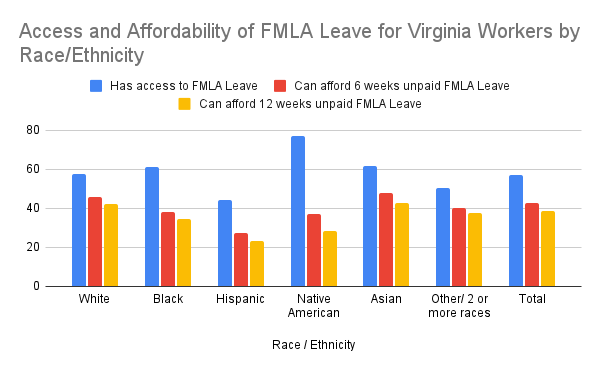February 5, 2024
Paid Time Off to Care: A Critical Tool for Racial, Gender, and Economic Justice
Being home when you are adjusting to life with a newborn, caring for your partner while they are seriously ill, or caring for yourself — all while not worrying whether you can pay the bills — is what we all want for ourselves and our neighbors. No matter the job or place of employment, many workers experience a major family or medical event throughout their life that will require them to take significant time away from work. Paid family and medical leave allows workers to take time to care for themselves and their families without putting their economic situation at risk. A paid family and medical leave program (PFML) is critical to advancing racial, gender, and economic justice in Virginia. State lawmakers have an opportunity in this legislative session to support working people and small businesses by passing a statewide PFML program.
Paid family and medical leave (PFML) refers to longer-term paid leave that a worker may take for family or medical reasons. Workers often use it to care for a new child, sick family members, or recover from a personal illness. There is no national form of paid family and medical leave (PFML) in the United States. Instead, the U.S. has the Family Medical Leave Act (FMLA), which is generally restricted to employers who have 50 or more employees, applies to only 56% of workers, and provides 12 weeks of time off with no guarantee of pay.
Because of FMLA’s limitations, many families are forced to choose between economic stability and their personal or family needs. In Virginia, just 57% of working people have access to FMLA leave. And, because FMLA does not guarantee pay and many families do not have the resources to forgo a paycheck, even fewer families (39%) can afford to take 12 weeks of unpaid leave from work.

A closer look at the data shows that people of color face greater barriers to taking unpaid leave. While Black workers in Virginia are more likely to technically have access to FMLA leave (61%), they are much less likely to be able to afford 12 weeks of unpaid leave from work (34%). And of Hispanic workers, 45% have access – the lowest level of access for any racial or ethnic group – but just 23% can afford to take off 12 weeks of unpaid leave from work. And working women in Virginia, both with and without children, are much less likely to be able to afford 12 weeks of unpaid leave from work than their male counterparts.
National data also suggests that paid family and medical leave is even harder to access overall, and particularly for people of color: 54% of non-Hispanic white workers had access to some form of PFML in 2017-2018, but access was significantly lower among Asian American (46%), Black (42%), and Hispanic (31%) workers. People who are paid less than $15 an hour have less access to both paid and unpaid leave than their higher-paid counterparts, are more likely to report job loss or fear of job loss as a result of taking leave, and are more likely to borrow money or need public assistance to cover lost wages.
Black women — who are at the intersection of racism and sexism, leaving many to work in low-paid jobs — are disadvantaged most by our current leave system. Nationally, an estimated 1.1 million instances of leave are needed by Black women but are not taken While 38 percent of the time, Black women who need leave do not take it, many of the Black women who do take leave do so without receiving pay. Thus, while FMLA has helped change workplaces for the better, its limitations leave people of color, low-income workers, working parents, and women behind.
Currently, 13 states and the District of Columbia have taken steps to promote access to time off to care by creating their own PFML programs. State-run PFML specifically provides paid time off from work and can cover much more of the workforce. Despite consistent efforts by advocates since 2018, Virginia has no universal PFML policy. Instead, working families in Virginia face a patchwork system that fails on several fronts, and over 40% of working people in Virginia do not have access to family and medical leave with a guarantee of pay. Virginia’s relatively new private paid family leave option also leaves out most working people and there are no minimum standards for benefit size, maximum duration, or other guardrails to ensure quality leave.
Data at both the state and national levels makes it clear that creating a paid family and medical leave program that is both paid and accessible to all Virginians is critical to breaking down barriers to taking paid time off to care, particularly for people of color, those who are paid low wages, women, and parents. State lawmakers have an opportunity to support working people and small businesses by passing and funding House Bill 737 and Senate Bill 373 during the 2024 General Assembly session. Many people, regardless of occupation or background, will need to take time off to care at some point in their lives. Making sure families can do so without fear of losing their job or income is a crucial step to making Virginia a better place to work, live, and care for their families.
Category:
Economic Opportunity

